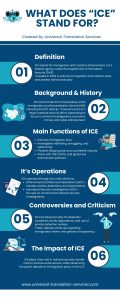What does ice stand for?

Overview of ICE
ICE, or Immigration and Customs Enforcement, is a U.S. government agency responsible for enforcing federal immigration and customs laws. It is one of several agencies in the Department of Homeland Security. It was created after the September 11 terrorist attacks. The agency was created in 2003. This happened after the Homeland Security Act of 2002 combined several agencies into one department. Among these were the Immigration and Naturalization Service and the U.S. Customs Service.
ICE is tasked with various responsibilities, including investigating immigration and customs violations, detaining and deporting undocumented immigrants, and combating transnational crime. The agency employs over 20,000 people, including special agents, deportation officers, and support staff.
ICE also works closely with other government agencies. This includes U.S. Customs and Border Protection and U.S. Citizenship and Immigration Services. Together, they help carry out its mission. It runs several programs, like Alternatives to Detention and the ICE Contact system. These help manage people’s movement and keep the public safe.
While ICE is essential for economic and national security, the agency has faced criticism. This criticism is about its handling of undocumented immigrants and its enforcement policies. The debate over the agency’s role in enforcing immigration laws remains a contentious issue in American politics.


History of ICE
ICE usually stands for the United States Immigration and Customs Enforcement Agency. However, it can mean different things depending on the context. In some situations, ICE refers to a substance, while in others, it represents an entirely different acronym. However, the agency’s responsibilities have expanded to include other areas, such as economic security and employment crime.
The roots of ICE go back to the U.S. Immigration and Naturalization Service (INS). The INS handled immigration enforcement until it was abolished in 2003. After the attacks, people became more worried about national security and the movement of people across the border. ICE was formed to address this concern and has since become an integral part of the government’s security approach. The agency works closely with other federal groups, like the FBI and CIA, to find and fight potential threats.
Aside from national security, ICE also plays a critical role in emergencies. Emergency medical and emergency room personnel often rely on ICE to identify individuals in the event of a medical emergency. ICE also works with emergency personnel in natural disasters, ensuring critical resources are available for those in need. Despite its role in maintaining security and safety, ICE has been criticized for its controversial actions in recent years. The agency’s methods of detaining and deporting immigrants have sparked controversy and outrage, leading to calls for reform.
Overall, ICE has a complex history and a significant impact on the safety and security of the United States. Its functions and operations will continue to be closely monitored as the agency progresses.
Whether you’re an immigrant pursuing a visa or already enjoying permanent residence, understanding the role of U.S.
Immigration and Customs Enforcement (ICE) is crucial. ICE’s main job is to enforce immigration and customs laws in the United States. However, its actions can also impact legal permanent residents. This is especially true if there are changes in status, compliance issues, or other legal problems.
What does ICE stand for?
ICE is an acronym that stands for several things in various contexts. One of the most common meanings of ICE is Emergency Contact. ICE allows people to have emergency contacts readily available on their phones or other personal devices. This is very important in an accident or medical emergency. First responders need to contact a person’s loved ones.
Another meaning of ICE is related to different types of emergencies. ICE can stand for In Case of Emergency, which guides what actions should be taken during specific situations. For example, there are ICE plans for natural disasters. These include hurricanes and earthquakes. They also cover medical emergencies like heart attacks and strokes.
In another context, ICE can mean a security program used by government agencies and law enforcement. This program, called Immigration and Customs Enforcement, is responsible for enforcing federal immigration laws and regulating trade. It’s important to know that ICE has faced criticism over the years. This is especially true for its role in enforcing immigration policies. Some believe the organization targets and mistreats immigrants, while others think they are necessary to maintain national security.


Different meanings of ICE in various contexts
ICE usually stands for the United States Immigration and Customs Enforcement Agency. However, it can mean different things depending on the context. In some situations, ICE refers to a substance, while in others, it represents an entirely different acronym.
One such context where ICE has a different meaning is in the world of technology. Here, ICE stands for “In-Circuit Emulator.” This device helps design and test electronic circuits. It allows developers to fix and improve code before using it in a final product.
Another context where ICE has a different meaning is in the world of sports. In hockey, ICE refers to the playing surface, and the term is also commonly used to refer to the sport of ice hockey itself. Moreover, ICE is also a term used in the health and wellness industry. In this context, ICE means “In Case of Emergency.” It is a phrase used on medical ID bracelets. These bracelets show that the wearer has a health condition that may need attention in an emergency. In the entertainment industry, the term “ICE” refers to a type of diamond jewelry. The acronym means “Internal Combustion Engine.” This term describes the motors that power most vehicles. It is also used in automotive engineering.
Overall, the different meanings of ICE across contexts show how one term can have many uses. Understanding these nuances can help us communicate more effectively and avoid confusion in everyday conversation.
Uses of ICE
The U.S. Immigration and Customs Enforcement (ICE) agency is known for enforcing immigration laws. However, the acronym ICE has other meanings in different contexts. One of the primary uses of ICE is in the medical field. The acronym means “In Case of Emergency.” It shows a person’s emergency contact information on their phone or belongings. This helps emergency responders quickly contact family or friends if the person cannot communicate or is unable to respond.
In the automotive industry, ICE is called an “Internal Combustion Engine.” This type of engine runs on gasoline or diesel and powers most cars on the road today. As the world shifts to greener transportation, ICE engines are under more scrutiny. This is because they produce harmful emissions and hurt the environment.
In the tech world, ICE is an acronym for “Information, Communications, and Entertainment.” This term includes the industries and technologies that provide and use digital content, like music, movies, and social media.
Lastly, ICE has also become a common slang term for methamphetamine, a highly addictive and illegal stimulant drug. The drug’s nickname comes from its crystalline appearance, which resembles ice. Read more about the USCIS-certified translation.
Controversies and criticisms surrounding ICE
Recent scrutiny of ICE focuses on its controversial immigration policies and practices. Critics accuse the agency of mistreating undocumented immigrants, using excessive force, and violating detainees’ civil rights. Reports from 2018 indicated that over the previous decade, more than 1,000 people had died in ICE custody.
Another point of contention is the separation of families at the U.S.-Mexico border. In 2018, the Trump administration enacted a policy that separated thousands of children from their parents. Many of these families remain separated, and the trauma from this policy continues today. Critics have also condemned ICE for using private prisons, which often have substandard conditions, including poor healthcare and sanitation.
Some people argue that private prisons encourage the detention of more individuals. The companies that run these prisons make money from each detainee. The militarization of ICE has also drawn criticism. In recent years, ICE agents have been equipped with military-style weapons and tactics, including armored vehicles and drones. Critics argue that this only escalates tensions and increases the potential for violence. Overall, the controversies surrounding ICE are complex and multifaceted. The agency plays an important role in enforcing immigration laws. However, its practices have raised serious concerns about human rights and civil liberties. The debate over immigration policy goes on. It is clear that ICE will still be a source of controversy and criticism.
Frequently Asked Questions
Yes. ICE can detain individuals even if their immigration status is still pending or under review. A pending application does not automatically prevent detention, though the person may request release on bond or parole.
ICE is a U.S. federal agency responsible for enforcing federal laws governing border control, immigration, and customs.
The mission of ICE is to protect the United States and its borders by enforcing immigration and customs laws, targeting transnational criminal organizations, and preventing the illegal movement of people and goods.
No, ICE is responsible for both immigration and customs enforcement. They take a wide range of issues related to border security, immigration enforcement, and customs investigations.
Some of the functions carried out by ICE include investigating immigration and customs violations, detaining and removing individuals in the country unlawfully, combating human smuggling and trafficking, and enforcing trade and customs laws.
Yes, ICE is a component agency of the U.S. Department of Homeland Security. It was created in 2003 as part of the reorganization of various federal agencies after the September 11, 2001, terrorist attacks.





